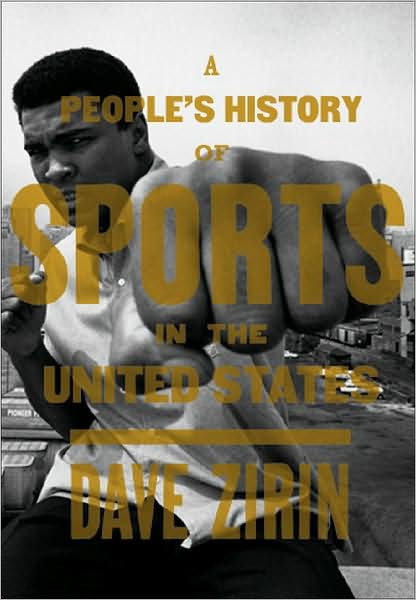|
Cartoons of
Dan McConnell
featuring
Tiny the Worm
Cartoons of
David Logan
The People's Comic
Cartoons of
John Jonik
Inking Truth to Power
|
Support the WA Free Press. Community journalism needs your readership and support. Please subscribe and/or donate.
posted July 24, 2009

book review
A People’s History of Sports in the United States (David Zirin)
review by Doreen McGrath
This article originally appeared in the Freedom Socialist newspaper (Seattle), April-May 2009.
Dave Zirin’s new book, A People’s History of Sports in the United States, is a home run. A part of the People’s History Series inspired by historian Howard Zinn, it spans quite a stretch of time and knocks out a comprehensive view of why we love and hate sports. At the same time, it blasts the adage that sports and politics don’t mix.
Sweep of history
Dave Zirin’s book covers US history from the time the first Anglos hit the eastern shore to the present, from the Native Americans’ furious game of lacrosse, through the urban game of “rat baiting,” to the founding of professional sports leagues and player associations. Through it all he views the history not from society’s upper crust, but from the bottom up. Always he salutes those who stood up to abuse and discrimination, and defends the legitimacy of activist athletes.
“This volume... stands proudly with the tradition of progressive dissenters in sports, people who have attempted to use the world of sports as a platform to advance ideas of resistance. These are people who have not allowed the politics of modern sport in the United States to be the province of those who financially control it.”
Zirin’s love of baseball shines through, covering all aspects of the game’s history and its working-class and African American roots. Early players’ unions had the slogan “Fire the boss!” Yet they excluded African Americans. Segregated in the Negro Leagues, Blacks were paid far less and worked in rough conditions.
But Zirin also notes, “There is another reading of the Negro Leagues at this time: an independent locus of power and a source of pride and support, much like the historically black colleges.”
Throughout the book, Zirin stays on track with both Black history and the women’s movement. The Civil War, women suffragists, Great Depression, world wars, Jim Crow segregation and the rights movements of the ‘60s and ‘70s are seen through boxing, football, basketball, the Olympics, tennis, golf and more.
The explosive story of Tommie Smith and John Carlos raising their fists for Black Power at the 1968 Olympics is stirring, as is the tale of tennis great Arthur Ashe’s steadfast political leadership against South African apartheid and for HIV-infected Haitian refugees.
Women’s early basketball “was a very rough-and-tumble operation. Freed from their corsets, they let their elbows fly freely as well.” Babe Didrikson won three gold medals at the 1932 Olympics on the track but also played golf and football. Asked by a reporter, “Is there anything you don’t play?” she responded with, “Yeah, dolls.” Of all Zirin’s books, this one does the best job of integrating women’s issues into the stories he tells.
Too few pages
In less than 300 pages, Zirin relates vignettes, short stories, and snippets covering everything from the Communist Party’s sports writer Red Rodney, to the entry of Latino players into major league baseball, to the exploding popularity of the Gay Games. He conveys not just his passion for sports but for building a better world in which we can play and watch them. The book is a treat to read.
What’s missing is more—about Native American, Asian American and Latino athletes in US history. Missing too is more about sportswomen of color (where did Black women play baseball during World War II?) I’d like to see an exposé of the impact on sports from devastating funding cuts at urban public schools.
I found it frustrating that Zirin tiptoes around the issue of class. He is dead right in saying that sports and politics are inseparable. But the biggest reason why is that we are living in a capitalist world where profit defines all. Zirin shows this repeatedly, but doesn’t explicitly express the logical conclusion—capitalism sucks for poor and working athletes, and the public that pays for those stadiums!
Lefties of the political sort will enjoy this book whether or not they are sports fans. As anyone trying to change the world knows, you can’t leave out any sector of rebels. That surely includes the wide world of sports.
Zirin makes a point of inviting us to jump in. “If we challenge sports to be as good as they can be,” he finishes, “they can propel us toward a better world, a world worth playing in—and worth fighting for.”
Doreen McGrath is a computer programmer, political radical, and staunch fan of the Storm, Seattle’s women’s basketball team.


